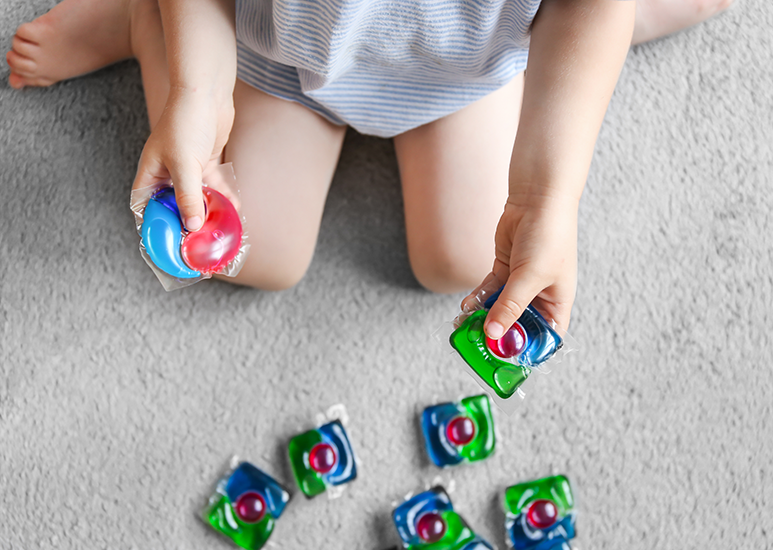Did you know that most people affected by poisoning are under the age of six? According to the National Capital Poison Center, children between one to two years of age are at the highest risk - even though poisoning accidents can happen to anyone. If you have young children in the home its important to understand what items to be cautious with and how to store them.
Check Your Home
One of the most common spaces where children are exposed to poisonous substances is at home. Here's a list of products that could be a danger to your child getting a hold of. Review this list and ask yourself, "Are any of these within reach of my child?"
- Alcohol
- Over the counter and prescription medications, vitamins or supplements
- Tobacco, e-cigarettes, liquid nicotine
- Bug spray, pest traps, pesticides
- Button/lithium batteries from toys, greeting cards or key fobs
- Household cleaners
- Laundry detergent pods
- Personal care items like hand sanitizer, contact lens disinfectant
- Oils and lubricants
- Paint, paint thinner, hazardous craft materials
- Poisonous houseplants
Practice Preventive Measures
The first step toward preventing a poisoning is to keep hazards out of reach. Here are some simple suggestions:
- Always lock up cleaning supplies, medications, paint thinners and other potentially poisonous items. Even if the cabinet is elevated, it should still be locked.
- Keep items of the same type in one locked area. Pair medications together, keep household cleaners in one cabinet and place outdoor chemicals in a safe, locked storage unit.
- Keep each hazardous item in its original container. This helps prevent children from mistakenly ingesting a poison in an unmarked bottle. Should an incident arise, it also gives first responders a clue as to how much poison has been ingested and the ingredients.
Create an Action Plan
Kids act fast and so do poisons. If poisoning does occur, the key is to have a plan in place to get help as quickly as possible.
The most important thing to remember is to call Poison Control before calling the doctor.
Poison Control knows more about poisons than even the best doctors. Their 24/7 service, daily experience and the right resources at their fingertips makes them the experts in these scenarios.
If a poisoning occurs, here are some recommendations:
- Call the National Poison Control Hotline at 800-222-1222. Program the number into your cell phone and add a sticker/card with the number on the fridge for quick reference.
- Don’t use syrup of ipecac or other items to induce vomiting without explicit instruction from Poison Control. Although this was recommended for years, it could actually do more harm than good by delaying treatment, not removing all of the poison from the stomach and causing additional damage to the esophagus.
- When seeking treatment, bring the original packaging/container. This helps medical professionals know what and how much was ingested.
More Information on Poison Response
For more on poison prevention and response, contact your local Poison Control Center at 800-222-1222, or visit the HRSA Poison Help website.
